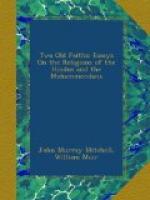[Sidenote: Worship of Vishnu.] The priest bathes, and then awakes the sleeping god by blowing a shell and ringing a bell. More abundant offerings are made than to Siva. About noon, fruits, roots, soaked peas, sweet-meats, etc., are presented. Then, later, boiled rice, fried herbs, and spices; but no flesh, fish, nor fowl. After dinner, betel-nut. The god is then left to sleep, and the temple is shut up for some hours. Toward evening curds, butter, sweet-meats, fruits, are presented. At sunset a lamp is brought, and fresh offerings made. Lights are waved before the image; a small bell is rung; water is presented for washing the mouth, face, and feet, with a towel to dry them. In a few minutes the offerings and the lamp are removed; and the god is left to sleep in the dark.
The prescribed worship is not always fully performed. Still, sixteen things are essential, of which the following are the most important:
“Preparing a seat for the god; invoking his presence; bathing the image; clothing it; putting the string round it; offering perfumes; flowers; incense; lamps; offerings of fruits and prepared eatables; betel-nut; prayers; circumambulation. An ordinary worshiper presents some of the offerings, mutters a short prayer or two, when circumambulating the image, the rest being done by the priest."[31]
We give one additional specimen of the ritual:
“As an atonement for unwarily eating or drinking what is forbidden eight hundred repetitions of the Gayatri prayer should be preceded by three suppressions of the breath, water being touched during the recital of the following text: ’The bull roars; he has four horns, three feet, two heads, seven hands, and is bound by a three-fold cord; he is the mighty, resplendent being, and pervades mortal men.’"[32]
The bull is understood to be justice personified. All Brahmanical ceremonies exhibit, we may say, ritualism and symbolism run mad.
[Sidenote: Caste.] The most prominent and characteristic institution of Hinduism is caste. The power of caste is as irrational as it is unbounded; and it works almost unmixed evil. The touch—even the shadow—of a low caste man pollutes. The scriptural precept, “Honor all men,” appears to a true Hindu infinitely absurd. He honors and worships a cow; but he shrinks with horror from the touch of a Mhar or Mang. Even Brahmans, if they come from different provinces, will not eat together. Thus Hinduism separates man from man; it goes on dividing and still dividing; and new fences to guard imaginary purity are continually added.




